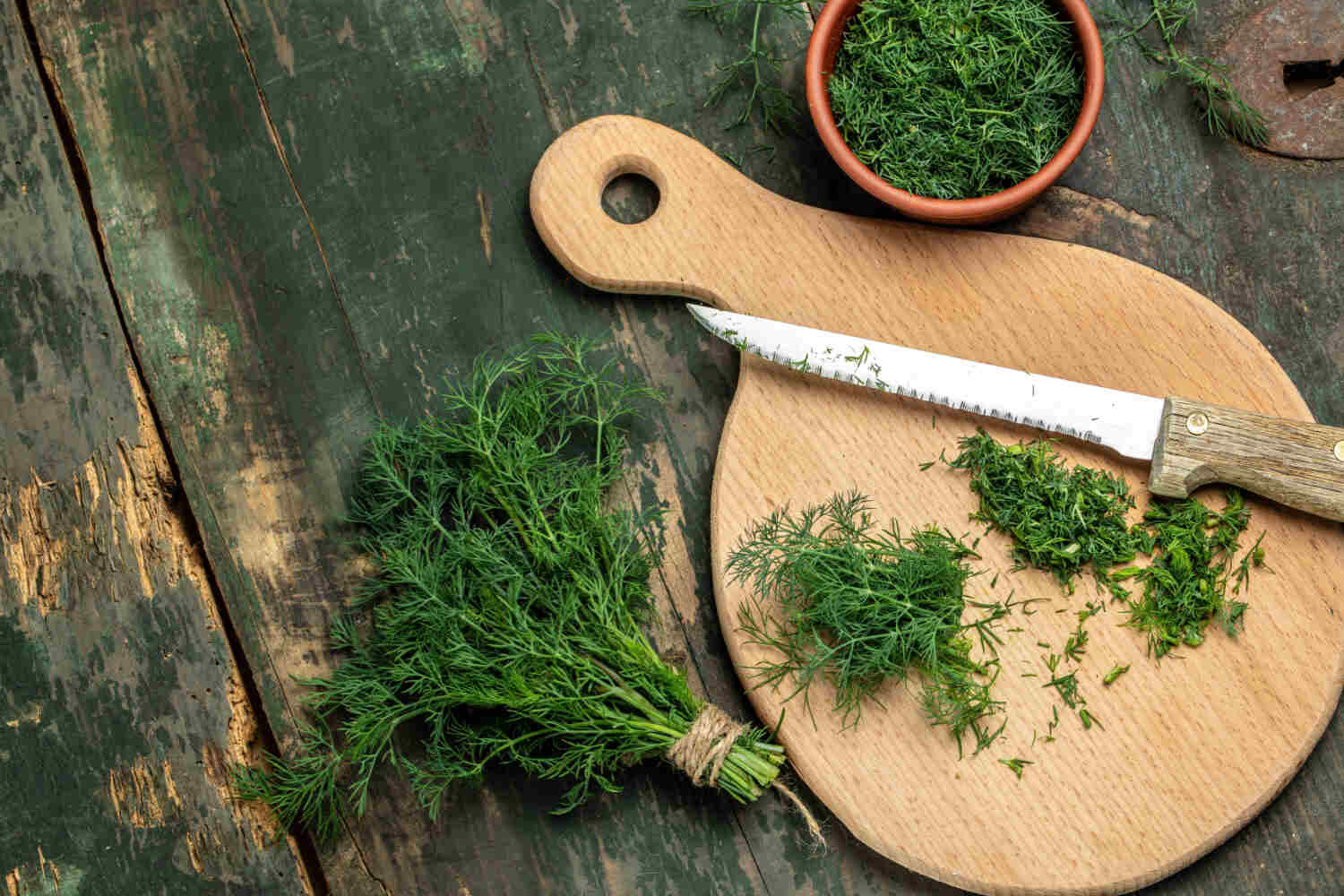
When expecting a child, a woman’s perspective shifts dramatically, and she becomes acutely conscious of the impact of her every action on the health of herself and her unborn child. Like Dill, herbs with a strong flavor and scent tend to pique people’s interest at this time of nutritional uncertainty. Dill’s feathery leaves and unique flavor have made it an integral part of the world’s cuisines. But the concern remains: Is it safe to take dill during pregnancy?
The article sheds light on the mystery surrounding dill intake during pregnancy as we negotiate the complex terrain of maternal nutrition. From comprehending the nature of Dill to analyzing its possible advantages and hazards, we engage on a voyage that combines the knowledge of tradition with current research findings. It will give pregnant mothers a compass to navigate the oceans of dietary choices confidently.
In This Article
- What Is Dill?
- Is It Safe To Eat Dill During Pregnancy?
- Health Benefits Of Eating Dill During Pregnancy
- Are There Any Side Effects Of Eating Dill During Pregnancy?
- Who Should Not Have Dill During Pregnancy?
- FAQ’s
What Is Dill?
Dill, or Anethum Graveolens as it is known in botany, is a member of the Apiaceae (celery) family and grows as an annual plant. With its unique feathery leaves, Dill is used in various cuisines worldwide. Dill weed leaves and seeds add a distinctively sweet and tangy taste to food. Dill has a high nutritional value since it contains essential nutrients, including vitamins A and C, calcium, and iron, in addition to its culinary uses. This herb is essential in elevating the flavor and healthfulness of many different dishes.
Is It Safe To Eat Dill During Pregnancy?

In terms of pregnancy-related worries, food and herb’s safety rank high on the list. When used sparingly, Dill is deemed safe to consume during pregnancy. It’s a great way to spice up your meals without worrying about the health of you or your unborn child. Dill is an excellent source of essential minerals, including vitamins A and C, calcium, and iron. Both the mother and the baby’s health benefits greatly from these nutrients. However, like any herb or spice, Dill should be used sparingly since too much can have adverse effects.
According to research article published in National Library of Medicine, using Dill seeds while pregnant may shorten the time it takes for labor to begin. Thus, expectant mothers should talk to their doctors before making any significant diet changes. Particularly affected are people with previous diseases and those who take certain drugs.
Health Benefits Of Eating Dill During Pregnancy
Both the mother and the growing child can benefit from consuming dill during pregnancy. A few potential benefits are as follows:-
Rich In Nutrients
Dill is an exceptional source of nourishment because of its wide variety of vitamins and minerals. Dill’s vitamin A content is significant since it helps shape the baby’s eyes, skin, and immune system. The plant also helps the mother and the infant since it contains vitamin C, an essential immune system booster. Dill’s iron concentration helps prevent anaemia, which can be common during pregnancy, and its calcium level is vital for the mother’s bone health.
Aids In Digestion
Nausea and indigestion are just two of the many digestive difficulties that pregnant women face. Dill has been used traditionally to treat these symptoms for quite some time. It may help relieve nausea and other symptoms of morning sickness due to its soothing effects on the digestive system.
Has Anti-inflammatory Properties
The anti-inflammatory chemicals found in Dill are well-known. Dill may help pregnant women suffering from inflammation-related concerns like edema or pain feel better overall. Dill’s anti-inflammatory properties may come in handy during the strenuous physical labor and delivery phases of pregnancy.
Calming Effect
One may appreciate Dill’s soothing scent outside the kitchen. Pregnant women, who often experience increased stress and anxiety, may find this quality particularly helpful. Dill may give a sensory boost that promotes relaxation, leading to a more peaceful and stress-free pregnancy.
Helps in Enhancement of Flavor
Sometimes, pregnant women find they no longer enjoy the flavor of certain meals. Dill has a particular taste that one can use to improve the flavor of other foods for pregnant women. For pregnant women whose taste preferences are shifting, this information might be invaluable in enhancing their dining experience.
Are There Any Side Effects Of Eating Dill During Pregnancy?

Dill may be beneficial, but there is some concern that it might cause harm if consumed during pregnancy. Here are the possible downsides you must take into account:-
1. Allergic Reactions
Many women have reported having dill allergies. Skin rashes, itching, and swelling are all symptoms of an allergic response. Seek immediate medical assistance if you have any symptoms of an allergic reaction after swallowing Dill.
2. Heartburn
Despite its reputation for helping with gastrointestinal issues, Dill may worsen your heartburn and acid reflux symptoms. These problems are more common in pregnant women, and excessive dill consumption may worsen them.
3. Blood Sugar Levels
It has been hypothesized that Dill may influence glucose levels in the body. If you have gestational diabetes or are at risk for developing diabetes during pregnancy, you should limit your dill consumption and keep a close eye on your blood sugar levels.
4. Uterine Stimulant
In certain ancient traditions, Dill has been regarded as a uterine stimulant. Due to the lack of proof, expectant mothers should proceed with care, especially in the first trimester.
Who Should Not Have Dill During Pregnancy?
While moderate use of Dill during pregnancy is considered safe for most pregnant women, the following groups of people should use caution or avoid it altogether:-
- Allergic Individuals– Avoid dill if you have a history of adverse reactions to it or other Apiaceae family plants like parsley or cilantro.
- Individuals with Blood Sugar Issues- Pregnant women who have diabetes or gestational issues should limit their dill consumption since it may alter blood sugar levels.
- Those Prone to Heartburn– Consuming excessive Dill may aggravate heartburn and acid reflux symptoms.
- Early Pregnancy– While the research is weak, certain traditional beliefs imply that Dill may work as a uterine stimulant. Consult your healthcare practitioner before adding Dill to your diet if you are pregnant, especially in the early stages of pregnancy.
Dill is a tasty ally in pregnancy nutrition and may positively affect health if ingested in moderation. Dill is acceptable in a healthy pregnancy diet because it is packed with nutrients and may help with digestion. However, one should use care due to individual factors such as allergies and other health issues. Never disregard professional medical advice in favor of self-diagnosis. When used moderately, dill during pregnancy may be a wonderful and nutritious friend on the road to a happy and successful pregnancy.
FAQ’s
1. Is Dill Leaves Good For Babies?
Dill leaves can offer nutritional value when added to a baby’s food at the right time. It is essential to wait until the infant is ready for solid foods and to introduce new components gradually so that one may catch any allergic responses early. As usual, speaking with a paediatrician before introducing new meals is advisable.
2. Can We Eat Raw Dill Leaves?
Dill leaves are edible in their raw form and lend a tangy, fresh taste to foods like salads, dips, and more. Pregnant women, however, should ensure the Dill is well-cleaned to eliminate toxins. Raw dill leaves can cause stomach upset if consumed in large quantities; therefore, moderation is essential. It’s best to talk to a doctor if you have any questions or concerns about your health.

